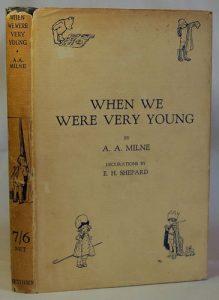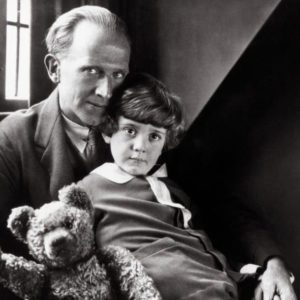It began with a poem. A poem about a little boy saying his prayers. A. A. Milne gave it to his wife, and she mailed it to a magazine —where it was published. 

Soon there were calls for more. Milne, already a published author and playwright, obliged, and When We Were Very Young, a poetry collection for children, was published in 1924.
On Christmas Eve, 1925, Winnie-the-Pooh made his first appearance in literature. The story, “The Wrong Sort of Bees,” was published in The London Evening News. The next year, Winnie-the-Pooh was published.
The popularity of Pooh soon outshadowed any of Milne’s other achievements. But before we let Pooh into the spotlight, let’s step back.
Born in London, 1882, Milne had a good childhood —even if Milne’s mother did insist on dressing her three sons like Little Lord Fauntelroys. Milne’s father was a teacher, and he enjoyed reading to the boys, from Uncle Remus to The Pilgrim’s Progress.
Milne studied mathematics at Cambridge and served as editor of the Granta, a Cambridge undergraduate paper. Upon graduation, and to his family’s disappointment, he announced he was going to London to be a writer. In his third year in London, at the age of 24, Milne became assistant editor to Punch magazine. In 1913, he married Dorothy de Selincourt. When World War I came, Milne enlisted, but he continued to write during the war years.
In 1920, Christopher Robin was born. Though named Christopher Robin —a combination of names favored by each parent— the child would be nicknamed Billy Moon. Still, in poetry and prose, Milne would write about Christopher Robin. While he and his son would separate the character of Christopher Robin from the actual boy, E. H. Shepard’s drawings and Christopher Robin Milne are quite similar.
Dorothy Milne bought a stuffed bear for Christopher Robin’s first birthday. He would be christened Winnie-the-Pooh. Four years later, the Milnes bought Cotchford Farm in Ashdown Forest. This forest would inspire the Hundred Acre wood —and it was used by E. H. Shepard as a base for his illustrations.


It would be nice to conclude, “they all lived happily ever after.” 

Milne lived at a time the world was changing. He saw the reality of war —and would write against it at times. He served with the lost generation. In the midst of bleakness and upheaval in the world, his refuge does not seem to be faith.
Instead, he looked to writing. He immortalized childhood. His poetry is full of whimsy. On the written page, Milne could understand a child. He could capture what made a child “tick.” The inbred egotism. The fanciful imagining. In Winnie-the-Pooh, he created placid, wonderful tales: funny, poignant, and reassuring. The Hundred Acre Wood is a safe place.
With God-gifted imaginations we can love and enjoy Milne’s poetry. We can wander the Hundred Acre Wood. But there, like Milne, we will not ultimately find contentment and happiness.
Resources:
Winnie-the-Pooh: Two True Stories
A. A. Milne and the Curse of Pooh —BBC
Also, for this month, you can listen to a wonderful BBC version of Winnie-the-Pooh.
Stay Up to Date!
Get the information you need to make wise choices about books for your children and teens.
Our weekly newsletter includes our latest reviews, related links from around the web, a featured book list, book trivia, and more. We never sell your information. You may unsubscribe at any time.
Support our writers and help keep Redeemed Reader ad-free by joining the Redeemed Reader Fellowship.
Stay Up to Date!
Get the information you need to make wise choices about books for your children and teens.
Our weekly newsletter includes our latest reviews, related links from around the web, a featured book list, book trivia, and more. We never sell your information. You may unsubscribe at any time.
FREE Bible Guide!
Get a guide to the Best Bibles for Children and Teens. Perfect for an Easter gift.
We'd love to hear from you!
Our comments are now limited to our members (both Silver and Golden Key). Members, you just need to log in with your normal log-in credentials!
Not a member yet? You can join the Silver Key ($2.99/month) for a free 2-week trial. Cancel at any time. Find out more about membership here.
1 Comments
Leave a Comment
You must be logged in to post a comment.


[…] on Christmas Eve, 1925, in the London Evening News, A.A. Milne’s short story “The Wrong Sort of Bees” gave readers the holiday gift of […]